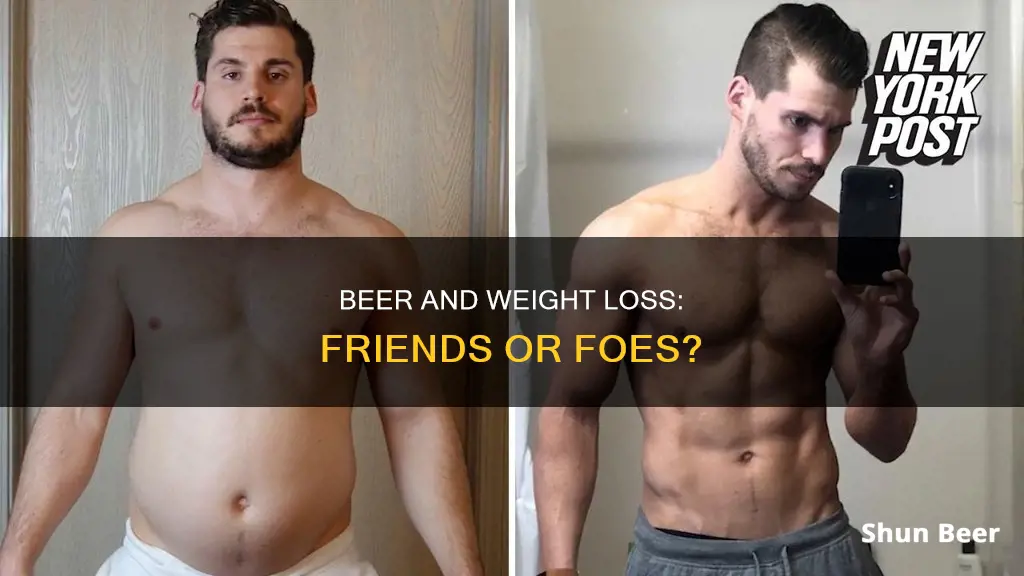
If you're trying to lose weight, you might be wondering if you need to give up beer. The answer is not straightforward and depends on several factors. Firstly, it's important to understand that weight loss is primarily determined by your total calorie intake and expenditure. Beer contains calories – a 12-ounce serving of regular beer has about 150 calories, while light beer has around 100. Therefore, cutting out beer can reduce your calorie intake, which may lead to weight loss. However, this is not the only factor to consider.
Alcoholic beverages, including beer, provide empty calories that offer little nutritional value. When you consume these calories, your body prioritises burning them for energy, increasing the likelihood of storing other energy sources, such as carbohydrates and fats, as body fat. This process can contribute to weight gain. Additionally, alcohol can cause bloating and inflammation, further impacting your weight.
Quitting alcohol can have other health benefits beyond weight loss. It can improve your sleep quality, reduce blood pressure, lower your risk of liver disease and cancer, and improve your mental health. However, it's important to note that everyone's experience with weight loss and quitting alcohol is unique. While some people may experience significant weight loss by quitting beer or alcohol, others may not see as dramatic results. This is because individual factors, such as metabolism, activity levels, dietary habits, and overall lifestyle, also play a role in weight loss.
If you're trying to lose weight, reducing your alcohol intake is generally recommended. However, you can also implement strategies to drink more mindfully, such as being mindful of serving sizes, alternating alcoholic drinks with non-alcoholic beverages, and prioritising healthy food choices. Ultimately, the decision to stop drinking beer for weight loss depends on your individual goals, health status, and relationship with alcohol. Consulting with a healthcare professional can help you make an informed decision that aligns with your specific needs and circumstances.
What You'll Learn

Beer contains a lot of calories
Beer is a significant source of calories. A 12-ounce serving of regular beer contains 153 calories, while a light beer has around 100 calories. A standard pint of beer has 239 calories. These are not insignificant numbers, given that most people are advised to consume around 2,000–2,500 calories per day.
The calories in beer are often referred to as "empty calories" because they provide very little nutritional value. Alcoholic drinks are packed with calories, and a binge-drinking session can easily result in consuming more than the advised daily calorie intake.
For example, let's consider a person who drinks two 12-ounce servings of regular beer per night. By cutting out these beers, they would save over 300 calories per day, which could result in a weight loss of about 2.5 pounds per month.
Additionally, alcohol can hinder weight loss by disrupting hormone regulation and increasing cravings for calorie-dense foods. It also affects behaviours around food and drink, leading to mindless snacking and overeating.
Therefore, reducing or eliminating beer consumption can be an effective strategy for weight loss, especially when combined with other healthy lifestyle changes such as increasing physical activity and improving hydration by drinking more water.
Beer and Low-Carb Diets: What You Need to Know
You may want to see also

Alcohol is a significant source of carbs
Alcoholic drinks are packed with calories. A standard glass of wine has 133 calories, a pint of beer has 239 calories, and a bottle of alcopop has 172 calories. These aren't insignificant numbers, given that most people are advised to consume around 2000–2500 calories per day. A binge-drinking session can easily exceed the recommended daily calorie intake.
The calories from alcoholic beverages are known as "empty calories." This means they provide no nutritional value and actually increase the chances of fat storage and weight gain. Alcohol also causes bloating, as it is an inflammatory substance, especially when combined with sugary or carbonated liquids.
The average regular beer contains about 12 grams of carbohydrates per serving. When you go out and drink 3–4 beers, you are consuming hundreds of calories and carbs. If you drink heavily on a daily basis, you may be taking in 400 extra calories per day.
If you're trying to lose weight, it's important to consider the role of calories. Simply cutting out alcoholic drinks should theoretically help with weight loss, as alcohol contains a significant number of calories.
Drinking Beer in John McLaren Park: Is it Allowed?
You may want to see also

Alcohol affects your behaviours around food
Alcohol can affect your behaviours around food in several ways. Firstly, it can lower your inhibitions, making you more likely to overeat or make unhealthy food choices. Alcohol also affects your body's ability to metabolise food properly. It interferes with the production of stomach acids, which are necessary for breaking down food and removing unwanted bacteria from the stomach. Additionally, alcohol can damage the stomach wall, causing inflammation and lesions. This damage to the digestive system can lead to reduced absorption of nutrients and further contribute to unhealthy eating habits.
Furthermore, alcohol consumption is linked to increased food cravings, especially for calorie-dense foods. Research has found that alcohol activates agouti-related peptide (AgRP) neurons, which are responsible for functions including hunger. It also lowers the oxidation of fatty acids, leading to increased hunger and cravings as fatty acids play a crucial role in regulating appetite. The day after drinking, your body's hunger hormones (ghrelin) increase while the hormones that signal fullness (leptin) decrease, resulting in increased hunger and food intake.
Alcohol also provides "empty calories" or, as one source puts it, "selfish calories". These are calories that offer little to no nutritional value. A standard beer contains about 150 calories, and these calories are prioritised by the body for energy, leaving other sources of energy such as carbohydrates and fats more likely to be stored as fat. This process increases the chances of weight gain.
Additionally, alcohol can cause bloating and inflammation due to its inflammatory properties, especially when combined with sugary or carbonated substances. This can further impact your behaviours around food, as you may feel less inclined to eat when experiencing bloating or digestive issues.
Finally, alcohol affects your sleep quality, energy levels, and mental health. Poor sleep and low energy can lead to unhealthy food choices, as you may crave quick energy boosts or comfort foods. Therefore, alcohol's impact on your sleep and mood can indirectly influence your dietary habits and choices.
Beer and Fishing: What's the Legal Catch?
You may want to see also

Alcohol is a toxin that the body has to work hard to process
Alcohol is also a diuretic, meaning it increases the production of urine. This can lead to dehydration, which can have a negative impact on energy levels and overall health.
In addition to being calorific, alcohol can also hinder weight loss by affecting the metabolism of other nutrients. When the body is busy metabolising alcohol, it is unable to metabolise nutrients such as carbohydrates and fats, which are then stored as fat. This is why alcoholic drinks are referred to as empty calories.
Alcohol also affects the hormones that regulate hunger and fullness. It increases the release of dopamine, serotonin, and oxytocin, which can lead to increased cravings and overeating. It also blocks the hormone vasopressin, which is responsible for preventing the kidneys from getting rid of fluid. This is why people often need to urinate more frequently when drinking alcohol.
Heavy drinking can also lead to blood sugar dysregulation and insulin resistance, further contributing to weight gain and metabolic issues.
Finally, alcohol can disrupt healthy lifestyle habits that support weight loss. Drinking can lead to poor food choices, decreased physical activity, and disrupted sleep patterns, all of which can hinder weight loss efforts.
In summary, alcohol is a toxin that the body has to work hard to process. It provides empty calories, disrupts nutrient metabolism, affects hunger and fullness hormones, and can lead to poor lifestyle choices that hinder weight loss. Therefore, reducing or eliminating alcohol intake can be an effective strategy for weight loss, especially when combined with other healthy lifestyle changes.
Beer Consumption Post-Gastric Bypass: What You Need to Know
You may want to see also

Drinking less may help you lose weight, but it's not guaranteed
If you're trying to lose weight, you may be wondering if you need to stop drinking beer. The short answer is that it depends. While reducing your alcohol intake can help create a calorie deficit, which is necessary for weight loss, there are other factors at play as well. Let's take a closer look at the relationship between drinking less and weight loss.
Calorie Deficit
To lose weight, you need to create a calorie deficit, which means consuming fewer calories than your body needs. Alcoholic beverages, including beer, are a concentrated source of calories with little nutritional value. A 12-ounce serving of regular beer contains about 150 calories, while light beer has around 100 calories. Cutting out these extra calories by reducing your beer intake can help you create the necessary calorie deficit for weight loss.
Individual Factors
However, it's important to note that the effect of drinking less on weight loss is highly individualized. The amount of weight you lose, if any, will depend on various factors, including your starting weight, age, gender, diet, and physical activity level. Additionally, your drinking habits matter. If you only drink occasionally or in moderate amounts, you may not see a significant weight loss by cutting back. On the other hand, if you drink heavily or binge drink, you are more likely to experience weight loss by reducing your alcohol intake.
Other Benefits of Drinking Less
Even if you don't lose weight, there are other health benefits associated with drinking less beer or alcohol in general. Alcohol is a significant source of empty calories and carbs, which can contribute to weight gain and affect your overall metabolic function. Reducing your alcohol intake can also lead to improved sleep, better hydration, reduced bloating and inflammation, and a healthier gut. Additionally, drinking less can positively impact your mental health, energy levels, and skin.
Strategies for Drinking Mindfully
If you want to continue drinking while working towards your weight loss goals, there are some strategies you can implement:
- Fuel yourself properly before drinking to avoid overindulging in snacks or drinks.
- Be mindful of serving sizes and opt for bottled or canned beers to better control your intake.
- Choose clear liquors and mixers that are low in sugar to reduce the number of empty calories.
- Set time limits for drinking and alternate alcoholic drinks with water or other non-alcoholic beverages.
In conclusion, while drinking less beer may help you lose weight by creating a calorie deficit, it is not a guaranteed solution. The effect of reducing your alcohol intake on weight loss will depend on various individual factors. However, drinking less can offer other health benefits and improve your overall well-being. If you are concerned about your alcohol consumption or are struggling to reduce your intake, consider seeking support from a healthcare professional or a support group.
Enjoying Beer at the Beach: Is It Allowed?
You may want to see also
Frequently asked questions
A calorie deficit occurs when you consume fewer calories than your body needs, leading to weight loss. This can be achieved by reducing calorie intake, increasing physical activity, or a combination of both.
Beer is a concentrated source of calories with little nutritional value. A 12-ounce serving of regular beer contains about 150 calories. Drinking multiple beers can quickly add up to excess calorie intake, leading to weight gain.
Reducing your calorie intake by cutting out beer can support weight loss, especially when combined with healthy habits like physical activity and proper hydration. However, weight loss depends on various factors, including your starting weight, age, and overall lifestyle changes.
Yes, stopping or reducing your beer consumption can lead to improved sleep, better hydration, reduced bloating and inflammation, and potential savings on drinking expenses.
Instead of beer, opt for calorie-free beverages like water, unsweetened coffee, or tea. These drinks will keep you hydrated without adding extra calories to your diet.







